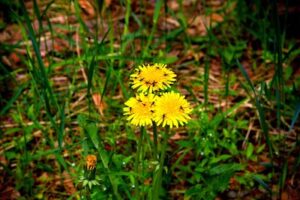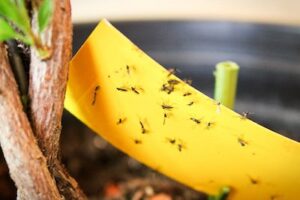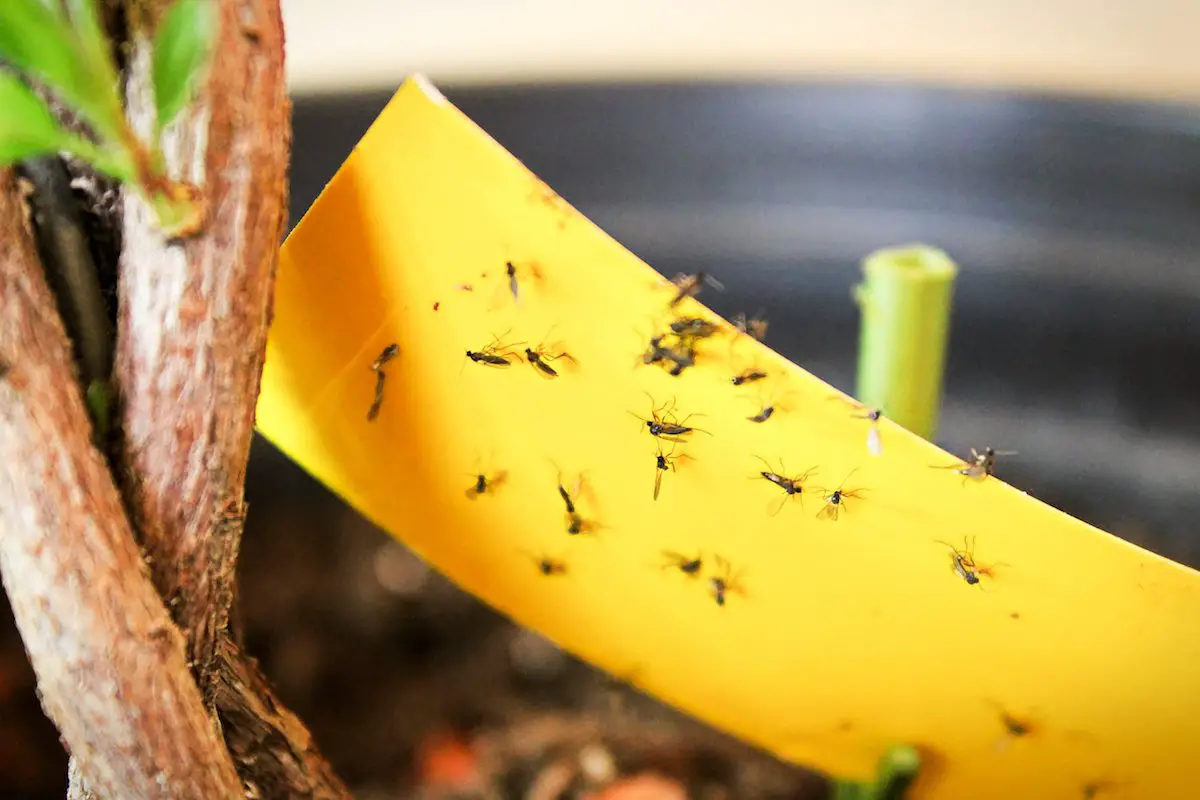Let’s Face It, Gnats Are Annoying.
There are more than 3,000 species of gnats worldwide. Most of them are harmless to humans. In fact, we probably wouldn’t even notice them if it weren’t for their annoying habit of flying around our heads.
These annoying gnats are especially prevalent during the Summer time, so how do you get rid of gnats naturally? Here are seven natural remedies for getting rid of gnats:
- Basil
- Citronella Candles
- Apple Cider Vinegar
- Peppermint Oil
- Cinnamon
- Lavender
- Cloves
While gnats are not typically considered to be dangerous, they can cause some problems for people. For example, their bites can be irritating and uncomfortable. In some cases, gnats can also transmit diseases to humans. This is why it is important to take steps to avoid being bitten by gnats.
There are several ways that you can protect yourself from gnats. First, make sure that you keep your skin covered when you are outdoors in areas where gnats may be present. Wear long sleeves and pants to protect your skin from their bites.
You can also use insect repellent on your skin to help keep gnats away. Be sure to follow the directions on the label carefully.
Lastly, you can try to avoid areas where gnats are commonly found. If you cannot avoid these areas, then be sure to cover your skin and use insect repellent. By taking these precautions, you can reduce your risk of being bitten by gnats and contracting a disease from them.
What Attracts Gnats?
Gnats are small, sometimes pesky insects that can be found near sources of moisture. While they generally don’t bite humans, their constant presence can be annoying. So what exactly attracts gnats?
One of the main things that attract gnats is standing water. This could be anything from a puddle to a swimming pool. Gnats are attracted to the moisture and will lay their eggs in these bodies of water. If you have standing water on your property, it’s likely that gnats will be present as well.
Another thing that attracts gnats is decomposing organic matter. This could be anything from fallen leaves to rotting fruit. The gnats are attracted to the smell of this decomposing matter and will lay their eggs in it. If you have any decomposing organic matter on your property, it’s likely that gnats will be present as well.
If you’re noticing a lot of gnats around your home, it’s important to take steps to eliminate the things that are attracting them. Remove any standing water and decomposing organic matter from your property. You may also want to consider using a pesticide to get rid of the gnats that are already present.
Why Do Gnats Swarm?
Gnats typically mate in mid-air, which is why they are often seen flying in large groups. The males will try to attract females by flying in intricate patterns and producing loud buzzing noises. Once a female has been attracted, the two gnats will mate and then go their separate ways.
Gnats also tend to swarm when they are looking for food. Gnats are attracted to the carbon dioxide that humans and other animals exhale, which is why they are often seen near our heads. Gnats will also feed on the nectar of flowers and other sugary substances.

Are There Natural Remedies For Getting Rid of Gnats?
Absolutely. In fact, you probably want to try using more natural remedies before you go to the store to buy some bug spray. If you are outside trying to enjoy your nice summer day and the little guys have formed a massive cloud around you, then here is a list of seven ways you can try to get rid of them.
1. Basil
Basil is not only a delicious herb to cook with but it is a herb that has many uses, one of which is as a natural insecticide. Basil works against gnats by releasing certain chemicals into the air that are toxic to them. These chemicals include eugenol and camphor, which are both known to be effective against various types of insects. Basil also repels other insects such as mosquitoes and flies. When used as an insecticide, basil should be applied directly to the area where the gnats are present. It is also important to keep in mind that basil can be toxic to humans if ingested in large quantities, so it should be used with caution. You can grow basil in a pot on your porch or patio, or even keep a few fresh sprigs in a vase inside your house. Gnats are attracted to the sweet smell of basil, so they’ll fly into the plant and get trapped.
2. Citronella Candles
Citronella candles are made of a type of oil called citronella oil, which is extracted from the leaves and stems of different species of lemongrass. This oil has a strong, lemon-like scent that is unpleasant to gnats, mosquitoes, and other insects. When the candle is lit, the heat from the flame vaporizes the oil, creating a cloud of mosquito-repelling smoke.
Most citronella candles contain a mixture of citronella oil and other oils, such as soybean or coconut oil. The addition of these other oils helps to keep the candle burning longer and makes the smoke less irritating to people.
The effectiveness of citronella candles in repelling mosquitoes varies depending on a number of factors, including the wind direction and speed, the size of the candle, and the amount of citronella oil in the candle. In general, however, citronella candles are best used in small, enclosed areas, such as decks or patios, where there is not a lot of movement of air.

3. Apple Cider Vinegar
Apple cider vinegar is an effective natural remedy for getting rid of gnats. The acidic nature of apple cider vinegar helps to kill gnats and their eggs. To use this method, simply fill a bowl with equal parts water and apple cider vinegar. Then, place the bowl near where you’ve seen gnats flying around. The gnats will be attracted to the vinegar and will fly into the bowl, where they will drown. You can also add a drop or two of dish soap to the bowl to help break the surface tension of the water, which will make it even easier for the gnats to drown. This method can take a few days to work, but it is very effective in getting rid of gnats.
4. Peppermint Oil
Peppermint oil is known for its ability to repel many different types of insects, including gnats. The oil works by masking the scents that gnats are attracted to, making it difficult for them to locate their prey. In addition, the strong smell of peppermint can be overwhelming to some gnats, causing them to avoid areas where the oil is present. Peppermint oil can be used in a variety of ways to keep gnats away, including applying it directly to the skin, diffusing it in the air, or spraying it around areas where gnats are commonly found.
While peppermint oil is an effective way to repel gnats, it is important to remember that it should not be used as a sole means of protection. Peppermint oil should be used in conjunction with other methods of preventing gnats, such as wearing long clothing and using mosquito nets. In addition, peppermint oil should not be used on open wounds or near the eyes, as it can cause irritation. When using peppermint oil to repel gnats, always test it on a small area first to see if you have any reactions.
5. Cinnamon
Cinnamon is another great natural gnat repellent. Cinnamon works against gnats by masking the scent of food and making it less attractive to them. It also has antiseptic properties that can kill insects.
To use cinnamon as a gnat repellent, mix equal parts of ground cinnamon and sugar. Sprinkle this mixture around the areas where gnats are a problem, such as near garbage cans or in your garden.
You can also make a cinnamon spray by mixing one teaspoon of ground cinnamon with two cups of water. Spray this mixture around the perimeter of your yard to keep gnats away.
If you have a gnat problem inside your home, sprinkle ground cinnamon on surfaces where they are seen, such as countertops or floors. You can also put a bowl of water mixed with cinnamon in rooms where gnats are a problem. The insects will be drawn to the water and drown.
6. Lavender
Lavender oil is a natural way to repel gnats. The oil has insecticidal and antiseptic properties that make it effective at killing and repelling these pests. Lavender oil works against gnats because of its chemical composition. The main active ingredient in lavender oil is linalool, which is an organic compound that has insecticidal and antiseptic properties. You can use lavender oil to make a DIY gnat spray by adding a few drops to water in a spray bottle. You can also add it to lotions or creams to apply topically, or diffuse the oil in your home to keep gnats away.
7. Cloves
Cloves have been used as a natural remedy to repel gnats for centuries. The strong aroma of cloves is thought to be what deters gnats from being near them. Cloves can be used in a variety of ways to keep gnats away, such as placing them in a small sachet or bowl near where you’ll be spending time, or adding a few drops of clove oil to a diffuser. You can also make your own clove repellent spray by mixing equal parts water and witch hazel with a few drops of clove oil, then spraying it around the areas where gnats are most likely to congregate.
You’ve Got All You Need
If you’re looking for a way to get rid of gnats that is both effective and natural, look no further than your kitchen pantry. There are a number of common household ingredients that can be used to make your own DIY gnat traps and repellents. Best of all, these methods are safe to use around children and pets.
Remember, if you want to take a more preventative approach, make sure you’re not giving gnats any reason to stick around in the first place. Keep your kitchen clean and free of food scraps, and empty your trash frequently. If you have indoor plants, make sure to keep them well-watered so that the soil isn’t too moist.

Annoying, But Purposeful
How are they purposeful, you ask?
As predators, gnats help to control populations of other insects. They also play an important role in decomposition, breaking down dead plants and animals into nutrients that can be recycled back into the ecosystem. In some cases, gnats may even be used as food for other animals.
Yes, they are annoying, and while they do provide a food source for several creatures such as bats, birds, and other insects, and they pollinate flowers, we all know they aren’t fun to have around. Hopefully, the tips and natural remedies shared above will help you have a pest-free summer ahead so that you can enjoy the outdoors.

